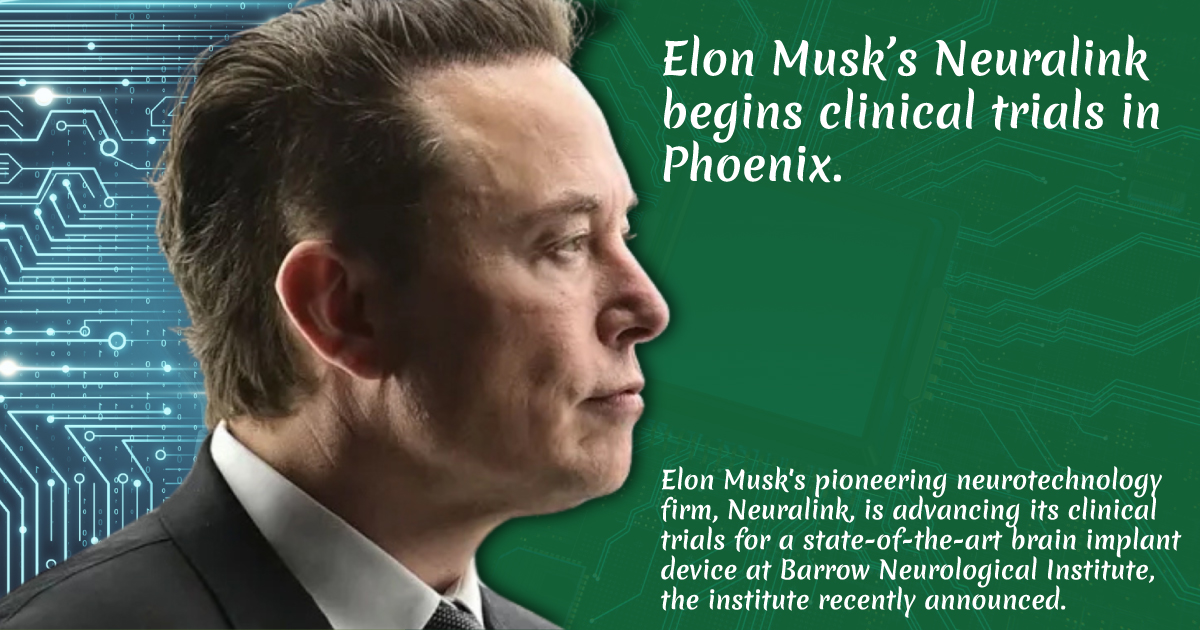Elon Musk Neuralink Trials in Phoenix 2024
Elon Musk Neuralink begins clinical trials in Phoenix.

Elon Musk Neuralink pioneering neurotechnology firm, is advancing its clinical trials for a state-of-the-art brain implant device at Barrow Neurological Institute, the institute recently announced.
In April, Barrow confirmed its participation as the venue for Elon Musk Neuralink PRIME Study, marking a significant milestone. The study’s initial participant, Noland Arbaugh, experienced a successful implantation of the company’s brain-computer interface in January. This revolutionary interface translates brain signals into actionable commands, enabling individuals with paralysis to control digital devices solely through their thoughts.
Arbaugh, a former athlete from Arizona who was left paralyzed following a diving accident, has showcased his remarkable ability to engage in online chess and maneuver a computer mouse cursor using only his brain activity.
In a recent blog post, Neuralink hailed the successful implantation of its brain-computer interface (BCI) as a pivotal achievement, with the potential to restore independence to millions of adults facing significant medical challenges. This breakthrough could particularly benefit those suffering from quadriplegia caused by conditions like amyotrophic lateral sclerosis (ALS) or spinal cord injuries.
“Barrow Neurological Institute is renowned for its world-class surgical expertise. They rapidly provide high-quality care to patients and make significant advancements in medical research,” stated DJ Seo, President and Chief Operating Officer at Neuralink. “Succeeding with them as our major site has been a very convincing experience, and we look onwards to a persistent positive partnership.“
Elon Musk Neuralink selected Barrow Neurological Institute as the location for its PRIME Study due to the institute’s renowned expertise in treating complex neurological conditions. According to the institution, Barrow is currently conducting over 300 clinical trials and performs upwards of 6,000 neurosurgeries annually.
“Barrow Neurological Institute has consistently been at the forefront of integrating innovative technologies in the operating room to enhance patient outcomes and advance clinical care,” said Michael Lawton, President and CEO of Barrow Neurological Institute. “Collaborating with Neuralink on the PRIME Early Feasibility Study aligns perfectly with our mission, embodying the pioneering research we are committed to.”
Neuralink study the first of its kind
According to the company, the Neuralink PRIME Study is a groundbreaking initiative, the first of its kind, open to adults suffering from quadriplegia as a result of vertical spinal cord injuries or ALS.
Neuralink’s N1 Implant functions by capturing neural activity through over 1,000 electrodes, distributed across 64 flexible “threads” that are finer than a human hair. These threads can be independently positioned within the brain to monitor neuron activity, as detailed in the company’s blog post.
Elon Musk Neuralink has developed a surgical robot, the R1 Robot, specifically designed to implant the threads into the cerebral cortex, strategically positioning them close to neurons. The N1 Implant processes the signals captured by these electrodes and wirelessly transmits them to a digital device through Neuralink’s application via Bluetooth connectivity.
Neuralink’s N1 Implant features an onboard battery that is recharged inductively using the N1 Charger, enabling operation without direct physical connections to external devices, as stated by the company.
Neuralink to submit data to FDA
Until recently, Elon Musk had not disclosed the location of Neuralink’s clinical study, though he has been sharing updates on the trial’s progress through various social media posts.
Medical experts have expressed concerns over Elon Musk Neuralink approach, highlighting the absence of published, peer-reviewed research and the company’s failure to list its study in the National Library of Medicine’s online database of clinical research studies.
Elon Musk Neuralink projects that its clinical study will span approximately six years. The company has initiated a patient registry on its website, which is accessible to adults aged 22 or older with quadriplegia or ALS, provided they have a caregiver.
“When an injury damages the central nervous system, it can interrupt the entire communication process, impacting an individual’s ability to perform daily tasks,” stated Rory Murphy, a neurosurgeon and associate professor at Barrow Neurological Institute. “We are confident that a brain-computer interface (BCI) machine may possibly create a digital bridge connecting the brain and spinal cord, possibly enhancing the value of life for those with severe spinal cord injuries.”
Barrow Neurological Institute has announced that an initial evaluation of the safety and usability of Neuralink’s devices will be submitted to the FDA in the upcoming months. Currently, in the preliminary phases of the study, Neuralink plans to release further updates about Arbaugh and future participants on its blog.
Elon Musk Neuralink revealed in a recent blog post, “We aim to initiate new studies across various regions and continually refine our technologies using insights gained from clinical trials, striving to help as many people likely.” After securing $280 million in a Series D funding round in August 2023, Neuralink started the recruitment of participants for its brain-computer interface (BCI) trials in September.




